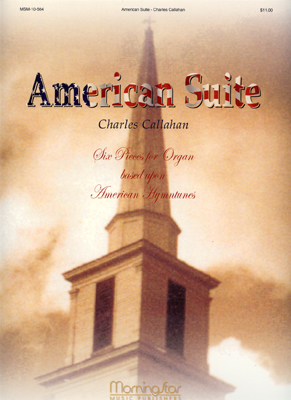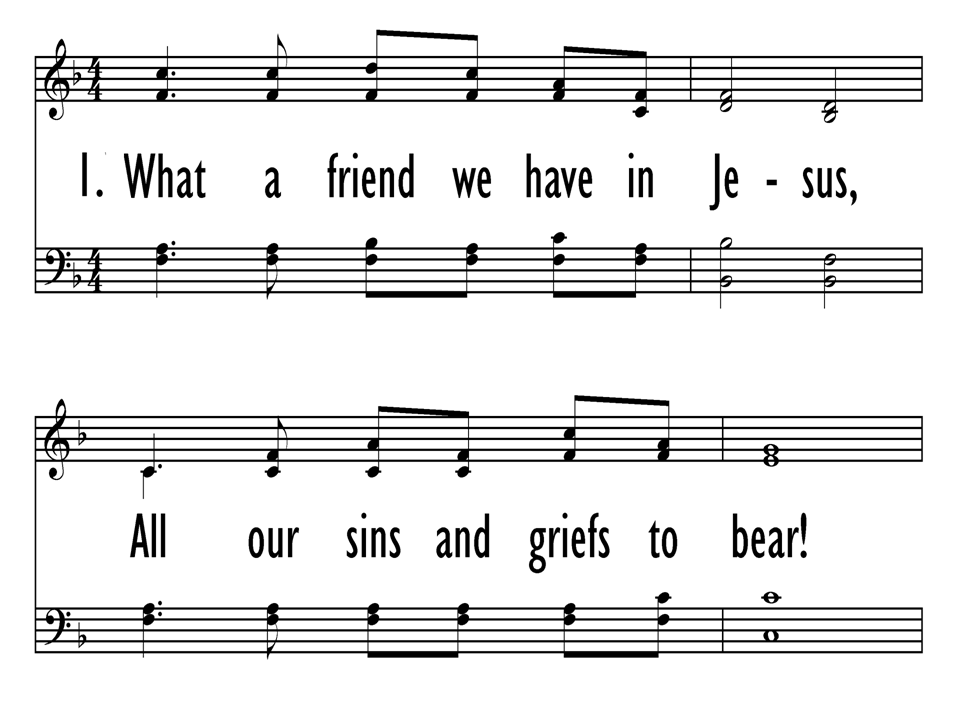- |
User Links
What a Friend We Have in Jesus
Hymn Information
- First Line
- What a friend we have in Jesus
- Author
- Joseph M. Scriven, 1820-1866
- Tune Name
- BEACH SPRING
- Harmonizer
- James H. Wood (1958)
- Tune Source
- <i>The Sacred Harp</i>, 1844
- Topic
- Jesus Christ: Friend · Jesus Christ: Peace · Hymns about Prayer · Elements of Worship: Offering Our Prayers
Copyright Information
- Text Copyright
- Public Domain
- Tune Copyright
- harm. © 1958, ren. 1986 Broadman Press, admin. Music Services · melody - Public Domain
- Reprint/Projection Information
- Words: The Words are in the Public Domain; you do not need permission to project or reprint the Words.
- Music: Permitted with a license from CCLI.com. If you do not own this license, please contact the copyright holder for permission.
Full Text
Scripture References
Further Reflections on Scripture References
Scriven's text clearly arises from his own experiences in life. Although not great poetry, the text has spiritual appeal and an effective repeated phrase, "take it to the Lord in prayer." Because of its simple encouragement to "pray without ceasing," the text is much loved in many circles of Christendom.
Bert Polman, Psalter Hymnal Handbook
Confessions and Statements of Faith References
Further Reflections on Confessions and Statements of Faith References
Belgic Confession, Article 26 provides the foundation for all our praying: “We believe that we have no access to God except through the one and only Mediator and Intercessor ‘Jesus Christ the righteous,’ who therefore was made human, uniting together the divine and human natures, so that we human beings might have access to the divine Majesty. Otherwise we would have no access.” We offer our prayers, therefore, “only on the basis of the excellence and dignity of Jesus Christ, whose righteousness is ours by faith.” Heidelberg Catechism, Lord’s Day 46, Question and Answer 120 verifies this privilege when it says, “Through Christ God has become our Father, and…just as our parents do not refuse us the things of this life, even less will God our Father refuse to give us what we ask in faith.”
What a Friend We Have in Jesus
Assurance
Additional Prayers
What a Friend We Have in Jesus
Hymn Story/Background
Author Information
Educated at Trinity College, Dublin, Ireland, he enrolled in a military college to prepare for an army career. However, poor health forced him to give up that ambition. Soon after came a second blow–his fiancee died in a drowning accident on the eve of their wedding in 1844. Later that year he moved to Ontario, where he taught school in Woodstock and Brantford. His plans for marriage were dashed again when his new bride-to-be died after a short illness in 1855. Following this calamity Scriven seldom had a regular income, and he was forced to live in the homes of others. He also experienced mistrust from neighbors who did not appreciate his eccentricities or his work with the underprivileged. A member of the Plymouth Brethren, he tried to live according to the Sermon on the Mount as literally as possible, giving and sharing all he had and often doing menial tasks for the poor and physically disabled. Because Scriven suffered from depression, no one knew if his death by drowning in Rice Lake was suicide or an accident.


 My Starred Hymns
My Starred Hymns







